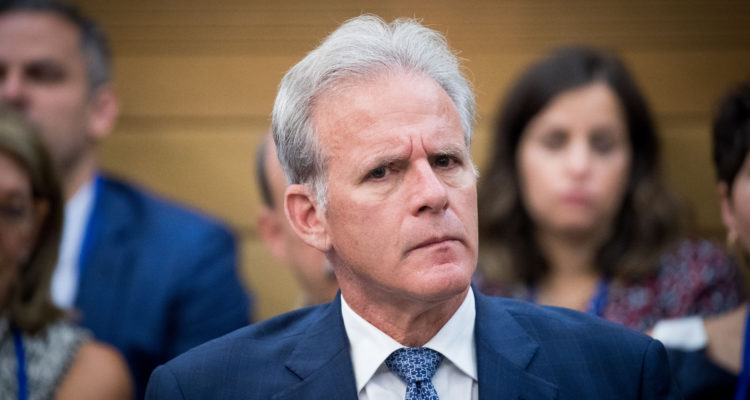Michael Oren fought in the First Lebanon War in 1982 in the Paratroopers Brigade.
By Debbie Weiss, The Algemeiner
Israel’s former Ambassador to the United States Michael Oren has traded his diplomatic credentials and suits for a dog tag and combat uniform by joining an Israel Defense Forces (IDF) rapid response counter-terrorism unit in a northern kibbutz, warning that the fall of the embattled north would pose the most significant threat to Israel’s central heartland.
Oren recently returned from Washington, DC, where he accompanied a delegation of displaced Israelis from the north for a series of talks and high-level meetings in the US capital.
The former envoy criticized Biden administration officials for lacking adequate answers for the evacuees they met with, implying they expected the evacuees to simply accept living in close proximity to a terror threat.
“No one is going to go back to living, say, in Metulla, which is literally a war zone with 150 houses destroyed and with Hezbollah on the other side of the fence,” he said, referring to the powerful Iran-backed terrorist organization in Lebanon.
Oren cited army estimates that as much as 40 percent of Israel’s evacuated north, numbering some 80,000 people, would not return home in the event of a ceasefire with Hamas in Gaza.
“We now know what terrorists on the other side can do to Israelis,” he added.
Oren asserted that Israel was misdirecting its focus with the fighting in Hamas-ruled Gaza to the south, investing its manpower and resources against the wrong enemy.
“We’re fighting the wrong war. We should focus our main energy on the north, which is a strategic threat. Hamas was and is a tactical threat. It’s not going anywhere.”
Hezbollah, which wields significant military and political influence across Lebanon, has been firing drones, missiles, and rockets at northern Israel daily since October, when the Israel-Hamas war in Gaza began.
The onslaught has forced Israelis living near the Lebanon border to flee to other parts of the country for safety.
Oren assailed the response by world leaders and global press to last week’s targeted assassinations of Hezbollah commander Fuad Shukr in Beirut and Hamas terror chief Ismail Haniyeh in Tehran, and rejected claims that the killings would make hostage negotiations tougher and foil the chances for regional quiet.
“The reaction of the world was extraordinary. By eliminating two mass murderers, they’re saying Israel has jeopardized peace. You can’t make this stuff up,” Oren said.
“What foils the chances for a hostage agreement [with Hamas] and for regional stability is not standing up to terror and not fighting.”
“Leaders of the United States and the world should thank Israel for eliminating the murderer of not just Israelis, and of Palestinians, but the murder of Americans,” he added.
Oren rejected claims that Israel was not operationally or logistically prepared for a full-scale war with Hezbollah, asserting that Israel had untapped resources ready for deployment.
“We have conventional means that we’ve never used before, and we could use them now, like our submarine force,” he said, declining to elaborate further.
Kobi Levy, a resident of Kfar Blum who is part of the rapid response team alongside Oren, hailed the former envoy’s decision to dust off his uniform for the first time in over a decade.
Oren fought in the First Lebanon War in 1982 in the Paratroopers Brigade.
According to Levy, many lawmakers and politically-affiliated groups, including the Brothers in Arms anti-government protest group, have briefly visited the kibbutz for what he termed “photo ops and empty promises.”
Oren, he said, “came with all his heart to listen. To us, the people of the north. He’s the only politician who understands exactly what the residents want.”
Levy also said that Oren wasn’t above doing whatever was needed for the team, from early morning drills to overnight guard shifts.
He predicted that Oren, who also served as a deputy minister in Israel’s 19th Knesset, had a “bright future” ahead of him should he make a return to Israeli politics.
Asked if such a scenario was on the cards, Oren was coy.
“Whether in a suit or a uniform, I’ve always been about service to our country and our people, and I’ll continue serving in any way I can.”
For the meantime, Oren was happy to be the “oldest guy by far” in the rapid response squad.
“I knew that if I wanted to advocate for the north, I needed to see it firsthand,” he said.
That experience has led him to discover things he would never otherwise have known.
One example he gave is the lack of financial support for Kfar Blum, which was not evacuated by the IDF and therefore receives no compensation.
More than 60 percent of the kibbutz’s residents have self-evacuated, including Levy’s own family which evacuated only last week over fears of a reprisal after last week’s double assassination.
The kibbutz, once known for being the cultural center of the north with several music festivals, has hosted thousands of soldiers passing through in the past ten months of war, and authorities have yet to pick up the tab, Oren said.
“They do it with love of course, but even just the water bill is a tremendous burden on this community.”
“I’m deeply impressed by the people here and their commitment to the north and to Israel,” he said.
“I’m not being sentimental; they are the embodiment of the Zionist ideal,” Oren added. “But the sense is that they’ve been forgotten.”





